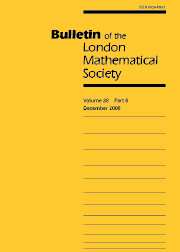Crossref Citations
This article has been cited by the following publications. This list is generated based on data provided by Crossref.
Gao, Weidong
and
Geroldinger, Alfred
2006.
Zero-sum problems in finite abelian groups: A survey.
Expositiones Mathematicae,
Vol. 24,
Issue. 4,
p.
337.
2009.
Combinatorial Number Theory and Additive Group Theory.
p.
57.

